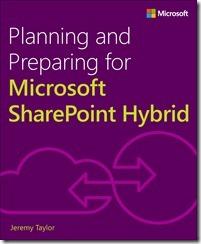Bill Baer on Microsoft SharePoint Hybrid
 Last week, Microsoft Press published Jeremy Taylor’s Planning and Preparing for Microsoft SharePoint Hybrid , a free ebook that covers SharePoint Hybrid’s foundational topics. Today we’re happy to share the book’s Foreword, by Bill Baer (Microsoft SharePoint Senior Product Manager), in which Bill describes the importance of SharePoint Hybrid.
Last week, Microsoft Press published Jeremy Taylor’s Planning and Preparing for Microsoft SharePoint Hybrid , a free ebook that covers SharePoint Hybrid’s foundational topics. Today we’re happy to share the book’s Foreword, by Bill Baer (Microsoft SharePoint Senior Product Manager), in which Bill describes the importance of SharePoint Hybrid.
This Foreword was not included in the original release of this book, but is now included in the download files. Updated files are available for download here.
Foreword
Whether you’re looking to the cloud as your future, long-term run state or simply want to bring cloud innovation to your datacenter, proper planning and preparation are paramount to your success. Planning and Preparing for Microsoft SharePoint Hybrid provides the background and information you need to get started in this new reality.
As both technology and connectivity continue to advance at an exponential rate, the world is becoming a giant network and people are becoming more hyper-connected, whether through consumer technologies we’re already familiar with, such as Facebook and Twitter, or commercial experiences such as Microsoft Office 365. This connectivity means information is created and travels faster than ever, making it possible for us to accomplish more, in an increasingly collaborative way.
The new “currency” of information has led to an explosion of data, and in today’s economy, saving money and gaining efficiencies remain important goals for organizations of all sorts. Enterprises are engaged in the continuous search for leading-edge solutions and ways to drive innovation, grow their businesses, and support changing user expectations as new employees enter the workforce.
Whether it’s the proliferation of devices making the workforce more mobile or the expectation that technology helps us to create more intelligent social connections, the cloud provides boundless potential for scalable, always-available services. Along with this exponential growth in information comes a need to derive more insights from data and more connectivity to that data.
In response to these expectations, cloud services like SharePoint Online in Office 365 provide an attractive alternative to on-premises business solutions; however, for a variety of reasons, organizations might want or need to deploy specific solutions in the cloud while still maintaining their on-premises SharePoint environment. These reasons can span a broad gamut: corporate and/or regulatory compliance, data sovereignty or sensitivity concerns, or even a significant investment in customization.
On the other hand, some organizations might want to gradually move their existing on-premises SharePoint services to the cloud, using a staged migration in which on-premises SharePoint workloads are moved to SharePoint Online one at a time. Hybrid functionality balances these needs and makes it possible for an organization to maximize ROI and extend its on-premises investments to the cloud by integrating services such as people and content discovery, data connectivity, compliance, and more that empower users implement greater business mobility.
For IT, hybrid provides the foundation for the transformation from systems administrators to value-added service brokers, balancing the needs for compliance and security with those of their users, while providing powerful capabilities and solutions through technology such as Microsoft Azure AD Connect, Microsoft Identity Manager, and familiar scripting scenarios with Windows PowerShell.
This e-book helps IT, end-to-end, with best practices to move toward a common goal shared by so many organizations today—to be cloud-ready and future proof.
Bill Baer, senior product manager (SharePoint), Microsoft